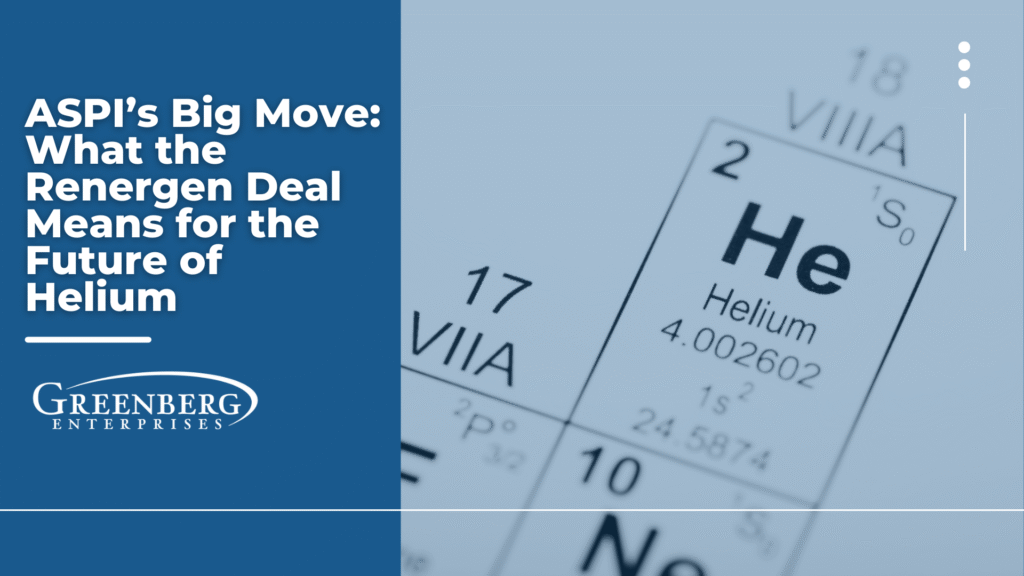
Taking a Step Back
There’s been a lot of solid coverage online about the ASPI–Renergen acquisition. The numbers are out there, the structure is clear—but with ASPI, it’s never just about the deal. It’s about the macro. Because when you step back and look at the broader picture, you start to see just how strategic and necessary this move really is.
Why Helium Matters (More Than You Think)
Helium isn’t just for party balloons, it’s a non-renewable, mission-critical resource that underpins some of the world’s most important industries:
- Healthcare: Keeps MRI machines cool and operational.
- Semiconductors: Essential in chip manufacturing.
- Aerospace & Defense: Supports rocket propulsion and military-grade tech.
- Quantum Research: Enables advanced cryogenics and supercomputing.
But here’s the problem: we’re running out. Fast.
The U.S. has been winding down its Federal Helium Reserve. Global disruptions, like the fires at Russia’s Amur plant, haven’t helped. And countries like Qatar and Algeria, which control much of the supply, come with geopolitical risk. At the same time, demand for helium is rising thanks to rapid advancements in AI, clean energy, and defense.
This isn’t just a supply issue – it’s a national security, innovation, and economic growth issue.
The Ripple Effect of a Helium Shortage
When helium becomes scarce, prices spike and industries take a hit:
- Hospitals face increased MRI costs (10–20%).
- Chipmakers experience production delays, raising electronics prices.
- Aerospace projects, like Artemis, are stretched thin with cost overruns.
- Research labs divert 30–40% of budgets just to afford helium.
Zoom out further and you’re looking at real GDP drag, suppressed hiring, and rising inflation due to foreign dependency. That’s the context in which this deal lands.
The ASPI–Renergen Deal, in Focus
On May 20, 2025, ASP Isotopes announced its acquisition of Renergen, a helium-rich South African gas company, for $161.8 million. The move gives ASPI direct access to one of the highest-grade helium reserves in the world—at a deep discount.
The breakdown:
- Deal structure: $107.3M in equity + $54.5M in assumed debt
- Asset: Virginia Gas Project — helium concentrations up to 12% (global average is ~0.5%)
- Funding: $500M in U.S. DFC-backed financing + $250M from Standard Bank
- Timeline: Phase 1C operational by 2026; Phase 2 projected to generate $300M+ EBITDA by 2030
This is the kind of deal that doesn’t just make headlines, it makes a dent in the problem.
Why This Deal Matters (to the U.S. and Beyond)
For ASP Isotopes, the acquisition strengthens its positioning in the critical materials space. For the U.S., it’s a major step toward securing a reliable helium supply chain, without the geopolitics.
- Security: Moves helium sourcing out of volatile regions
- Stability: Helps safeguard healthcare, defense, and semiconductor supply
- Growth: Opens the door to new investment and job creation
- Cost control: Prevents the pricing chaos that hurts downstream innovation
Final Take
This isn’t just a helium story. It’s a story about strategic foresight.
By acquiring Renergen, ASP Isotopes is doing what so few companies can, offering near-term relief to a real-world supply chain issue while positioning itself for long-term dominance in an under-supplied, high-demand sector.
At Greenberg Enterprises, we believe in supporting companies that solve global problems and this deal is exactly that. Smart. Timely. Impactful.
More to come.
